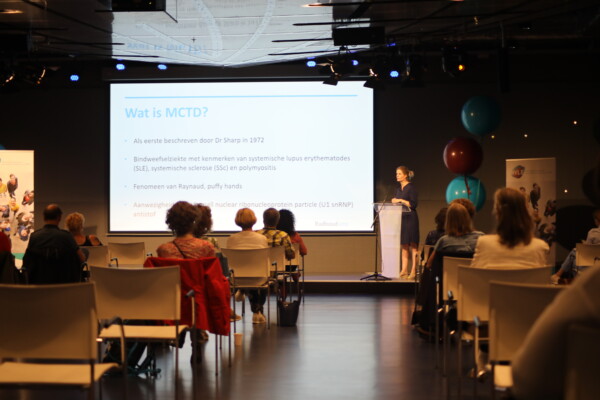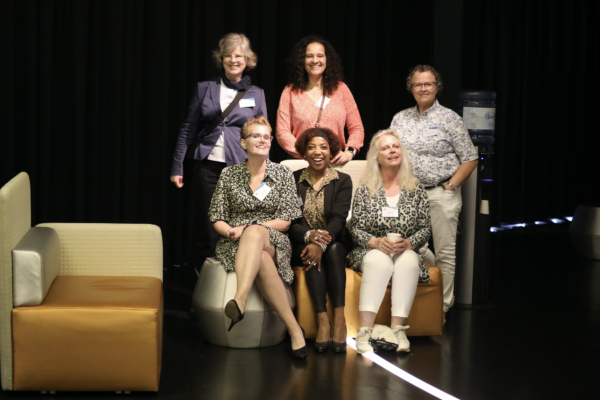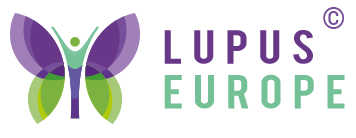Welcome back to our blog series on National Member News!
We are excited about getting our National Member news out to the world, so more people can find out what it is happening in each country and each member organisation! We caught up with Marga Schut and Wendy Zacouris from NVLE who talked to us about the great work the organisation is doing, the needs of lupus patients in the Netherlands, lupus and physical therapy, personalised plans for people with lupus and so much more!


Photo of NVLE Hybrid Congress with Social Distancing Measures Photo of the NVLE Congress Organising Committee
How do you keep in touch with or have contact with your members?
We recently had a meeting, an online meeting. For regional meetings, we used to have 30-60 people attending. Now in this era of doing things online 278 people wanted to attend, so that’s something different. So we do have some impact, more than we’re used to!
All the people who want to attend one of our meetings, they are able to raise questions in advance for the Speaker so that gives a lot of new information and it gives rise to new questions. The talks have the input the patients want and that’s great!
For this year the Board also made a postcard for New Year to wish everyone a good new year. We don’t do this for our members normally, but we wanted to do it this year send out to our members and that way it will also reach people who are at home or a bit lonely perhaps which is a plus. On the postcard we also included where to find information about the meetings we had the year before and information on what meetings are coming next. We’re very busy in terms of meetings!
We also have a facebook group, two facebook groups actually – one open and one closed that is only for patients (not even for partners or family members).
Did you have any special meetings or webinars during the past year (World Lupus Day, Rare Disease Day, Annual General Meeting etc)?
Yes! We had an online Convention and we have also had a webinar. Normally we have an RPS meeting – now we had a webinar. Our webinar was on scleroderma, lupus and the mouth (dental care) and it was with a dentist.
Every meeting we’ve had recently has been online and we will try to do that in the future too. We’ve now seen that people may not be coming to our meetings in person, but they do want to attend. There are a lot of barriers for people to in person attendance sometimes: maybe driving is too difficult or they are too tired. With a hybrid in person/online option we can have a lot more impact, a lot more people attending. The other bonus of this is that people can watch webinars or meetings on catch up too and members like that.
For the future we have to think of creative things. It’s important to have an advantage when you do attend in person – so we can have some people attending in person and some people online. Maybe we’ll do exclusive workshops for people who are there in person; we are still searching for the answer for this.
We are participating in more and more things as the years go on. We’re involved in research, in the writing of guidelines, in meetings with medical students about lupus, schooling for doctors about lupus, we give interviews to newspapers et cetera. We participate in a lot of things, and we are very busy!
Has it been difficult to keep connected with your members during the Covid19 pandemic?
It’s been more difficult, yes. For some activities we have been able to use small groups (of 5 people maximum) and they can meet to discuss local topics and to just connect with each other. People could reach out to the local regions to attend small groups, to make an appointment and try to interact with the small groups that exist.
There are other activities too. For example, we have one member who started walking with other patients as a coach – outside in a park, where people were able to keep a safe distance from each other and they could also have a cup of coffee afterwards. This was important for people looking for others to connect with.
We also have to say that we have a system under which all new members get a phone call from us. And we ask them “what do you need?”. Sometimes these phone calls with new members last for an hour and members like that very much. That’s also a good source for new volunteers!
We had our first in person team meeting in October 2021 in person after two years! We did it just in time, because the week after that everything closed again and we couldn’t have met. Our board meeting was also postponed because of covid19 measures. The team meeting in October was with new volunteers and it was lovely! We had a high turnout of people. We walked in a forest, we did tai chi and other really enjoyable activities where we could connect for half a day and we then had half a day of meetings. New people can really learn what the organisation is about and what work we are doing through meetings like that!
Have there been any circumstances during the pandemic that changed the way of living with lupus?
Most people during the pandemic were lonely. For people who were alone, they experienced loneliness very badly during the pandemic; it was very difficult for them. The situation was worse for people with immune system issues, like lupus, or immunosuppressed people; everyone was really scared of getting infected. All of us stayed inside more. This was more difficult in the beginning – now it’s kind of normal. People are all still really careful about covid19, they follow government guidelines etc.
We’ve also had another difficulty. In our facebook groups there are people who are against vaccination ‘simply’ because they are anxious. People may be anxious, so we try to give a balance. We always want to let people speak and express their opinion, but if it’s a very long discussion that leads nowhere, we have to step in, stop the discussion and agree to disagree. We make sure to tell people what our doctors, our medical advisory board, are saying on vaccination and that’s the advice we follow.
Has Digital Health improved or changed in your country?
Yes! In the first year of the pandemic, doctors started doing zoom consults and e-consults more and more, simply because patients couldn’t physically go to the doctor for routine issues. Now it’s all back to normal with in person visits. E-consults were available pre-covid as well and you were always able to see your test results, your medical dossier et cetera online. However digital options became more widely used.
Electronic prescriptions are also available; they were also available pre-covid.
What would you most need as support in your country for lupus?
What we’re dealing with now in our group is when you have lupus the rheumatologist or nephrologist treats your disease and doesn’t look further than that. But when you are a rheumatology patient with RA for example, you go to rheumatology nurse and the nurse asks you about work, mental health, nutrition, what do you need in your everyday life et cetera. That, we lack somehow in lupus.
Also, here you don’t get a prescription to go to physiotherapy unless you ask for it. You don’t get sent to the psychologist unless you ask for it. And still even then there are access difficulties a lot of times.
Somehow in lupus it’s a medical condition and that’s It and how you deal with life outside this medical condition is up to you. We want to change that! We want people to have a personalised plan to handle their illness, that includes their sex life, their job, their nutrition, mental health etc. We want to have more for patients!
Doctors find this kind of thing very difficult sometimes – we think it has to do with funding. For example, when the rheumatologist from the hospital refers you to a therapist, the hospital then has to pay for the cost of that referral. But when you go to a GP and ask to go to a therapist, and this might not be a specialist therapist for people with chronic conditions, then a different pot of money is responsible for paying for the therapist.
Is there anything you think Lupus Europe could help your organisation with?
We have been busy trying to get more access to physical therapy for people. Right now, physical therapy is funded for our patient group, but that is being looked at again to re-establish whether it’s necessary. The insurance companies want to narrow down the criteria for people who get physical therapy, because it costs a lot of money if you have physiotherapy twice a week for the rest of your life. So, they’re looking at old rheumatology diagnoses to see what is beneficial and what is not. We are looking for scientific research that has been done on physical therapy and lupus.
Is there any topic/theme/area that you think Lupus Europe should focus on, on something where European collaboration would make sense?
I think as a Dutch organisation we have a lot of things that are going very well, but still I think things like what we talked about before: a personalised package for lupus patients are incredibly important.
Exchanging good practice in lupus between countries is also important.
Maybe we have to make it about money, i.e. in this country a high percentage of people with SLE is able to work or is happier. It could be cost effective if at the beginning of your diagnosis you know more about your illness and you’re better at handling your Illness. Maybe then you’d be more able to continue working, and it’s the same with personalised packages, and maybe that’s better for society too.
A lot of people aren’t working because of their illness, they are too sick to work. But when their illness is dealt with better, then people could possibly work and be a productive member of society or a volunteer – that’s beneficial for society, good for a person’s mental health and good for the people around them too.
When we worked with guidelines – as a patient organisation we got paid for contributing to the guidelines last year, that was a first. That’s a start, we can give something back this way. We used the payment to contribute to research!
Are you aware of the Lupus Europe Member Capacity Building Program?
We are aware of it, but we haven’t needed to use it.
Could you tell us a bit about a dream you have as a group?
We want new people to come and do all the work we do now; basically, we want to make ourselves useless. Then we can step back and ensure that the organisation is sustainable in the long-term. We want the organisation to not be person dependent, to be sustainable.



